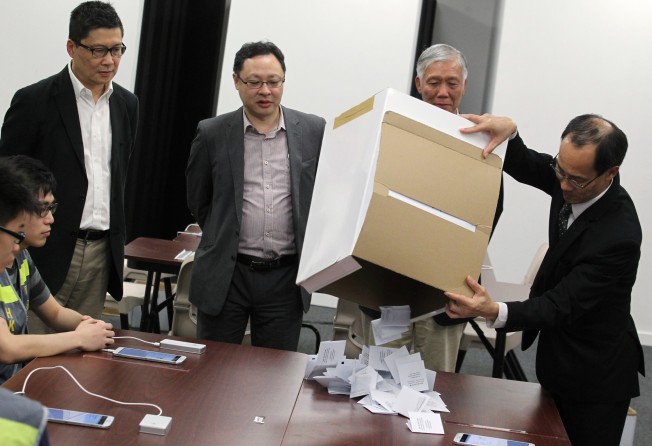Occupy Central accused of 'disenfranchising' moderates in vote
Occupy Central accused of failing to offer a range of choices in next month's reform 'referendum'

Occupy Central's choice of three reform proposals for a public vote next month risks "disenfranchising" Hongkongers who do not want "confrontation" with Beijing, a group advocating a more moderate plan says.
Occupy supporters met on Tuesday to shortlist three plans for its "civil referendum" on reform for the 2017 chief executive election. But all the plans chosen by the 2,500 people who attended the "deliberation day" allow the public to nominate candidates, which Beijing has ruled out.
The decision sparked concern from five moderate pan-democratic lawmakers and from Hong Kong 2020, the advocacy group set up by former chief secretary Anson Chan Fang On-sang.
The most popular plan was from activist group Scholarism and the Federation of Students. A plan from People Power came second. In both plans, a candidate would need nominations from 1 per cent of the electorate, or from a proportion of elected lawmakers or district councillors, to make the cut.
In third place was a plan from the Alliance for True Democracy, in which political parties, the public or the nominating committee could pick candidates.
Eight moderate proposals, including those from Hong Kong 2020, lawmaker Ronny Tong Ka-wah and a group of academics missed the cut. These proposals allow only the nominating committee to pick candidates, in line with the Basic Law, but candidates would need the support of just a minority of members.
The vote, from June 20 to 22, will decide which proposal Occupy endorses. It is planning a street blockade in Central if the government fails to come up with an acceptable proposal for reform.
A spokeswoman for Hong Kong 2020 said that by endorsing only plans involving public nomination "a relatively small and unrepresentative group of political activists has effectively disenfranchised a large section of the community who do not want to be led down a path towards direct confrontation with the central government".
Accountancy-sector lawmaker Kenneth Leung, who supported the Alliance's plan, said the shortlisting process "could be criticised for bearing resemblance to the 1,200-strong election committee" that chose the chief executive in 2012, which was ridiculed as a "small circle".
Leung suggested that, if turnout for the vote was low or there were a large number of abstentions, Occupy should hold another referendum involving six proposals including those from Chan's group and the academics.
Fellow lawmaker Charles Mok said the shortlist "may not truly represent the choices that the majority … want to see".
Tong expressed "surprise and disappointment" that Occupy had ousted his proposal through "unrepresentative screening".
Another pan-democratic lawmaker, speaking on condition of anonymity, said the public could be turned off the Occupy campaign by the way radicals mobilised support to ensure that their favoured proposals were chosen.
However, Occupy co-founder Benny Tai Yiu-ting dismissed suggestions the process had been "hijacked".
Scholarism's convenor Joshua Wong Chi-fung said the polling results "reflected mainstream opinion among pan-democrats".
Meanwhile, Democratic Party lawmaker Dr Helena Wong Pik-wan said she would meet officials of the central government's liaison office along with party colleague Sin Chung-kai to lobby for the alliance's plan.
"We will go into details of the three-track proposal and invite their response," she said.